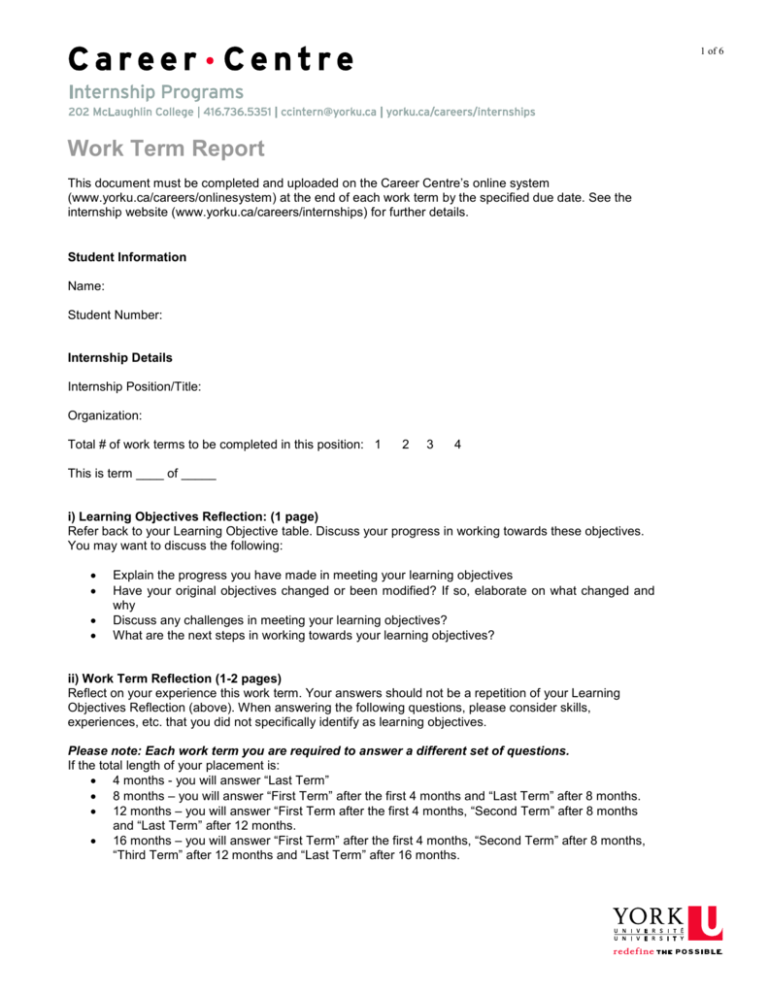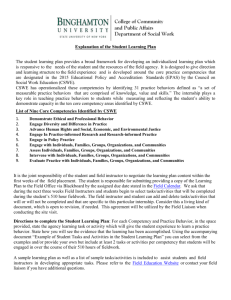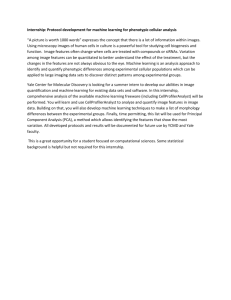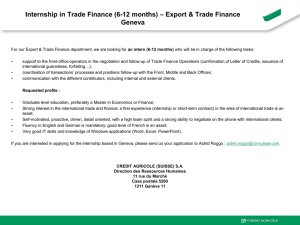Work Term Report Template
advertisement

1 of 6 Work Term Report This document must be completed and uploaded on the Career Centre’s online system (www.yorku.ca/careers/onlinesystem) at the end of each work term by the specified due date. See the internship website (www.yorku.ca/careers/internships) for further details. Student Information Name: Student Number: Internship Details Internship Position/Title: Organization: Total # of work terms to be completed in this position: 1 2 3 4 This is term ____ of _____ i) Learning Objectives Reflection: (1 page) Refer back to your Learning Objective table. Discuss your progress in working towards these objectives. You may want to discuss the following: Explain the progress you have made in meeting your learning objectives Have your original objectives changed or been modified? If so, elaborate on what changed and why Discuss any challenges in meeting your learning objectives? What are the next steps in working towards your learning objectives? ii) Work Term Reflection (1-2 pages) Reflect on your experience this work term. Your answers should not be a repetition of your Learning Objectives Reflection (above). When answering the following questions, please consider skills, experiences, etc. that you did not specifically identify as learning objectives. Please note: Each work term you are required to answer a different set of questions. If the total length of your placement is: 4 months - you will answer “Last Term” 8 months – you will answer “First Term” after the first 4 months and “Last Term” after 8 months. 12 months – you will answer “First Term after the first 4 months, “Second Term” after 8 months and “Last Term” after 12 months. 16 months – you will answer “First Term” after the first 4 months, “Second Term” after 8 months, “Third Term” after 12 months and “Last Term” after 16 months. 2 of 6 First Term: Outside of your learning objectives, what new skills did you gain? What previous skills did you improve? Also, please comment on any skills and knowledge you expected or wanted to gain but did not, and why you did not. What have you learned about your field/industry? What university experiences were useful in preparing you for your internship? List courses, assignments, extra-curricular, etc. Second Term: How have you found the transition from school to work (easier/harder)? Please elaborate. Please select one of your academic courses and discuss how you have applied theories and concepts you learned in class on the job. How would you define the corporate culture at your employer and how does this relate to your future career plan? Third Term: What have you done to contribute to and join the business community in the field you are pursuing? (Eg. networking, conferences, seminars, participating in blogs, etc.) Which aspects of global citizenship/corporate responsibility are important to you? Does they influence your future career decisions? Please elaborate. Last Term: How has this internship experience helped you confirm/change your course choices, academic and/or career goals? How will this internship experience affect your academic courses next term? What advice would you give to students who are about to start an internship placement in order to help them prepare and succeed on the job? What advice would you give to your employer about improving training, supervision, assignments, etc.? (This will be given to your employer). Would you be willing to write a testimonial in order to help us promote our internship programs? Yes No This testimonial may be used in print and/or digital promotional materials by York University. If yes, please answer the following question for the testimonial: What advice would you give to students who are considering completing an internship at York? iii) Competency/Skill Reflections (1-2 pages) Each term you are to select 3 different competencies/skills from the list below and create a STAR story for each competency/skill. STAR stories are often used to answer behavioral interview questions. Formula: STAR = S (situation) + T (task) + A (actions) + R (results) or (relate to learning) Behavioural interview questions work from the premise that how you behaved in the past is an accurate indicator of how you will likely behave and what skills you will likely call upon in response to a similar situation in the future. The STAR formula is recommended for answering questions in which you are asked or expected to provide an example of a time when you demonstrated a particular skill or asset. Following the formula will help to ensure that you provide specific details and concrete evidence for your competencies. 3 of 6 S (Situation) - Where were you when this happened? (e.g. Working as a Software Developer Intern at BlackBerry in the Application Development Department). When did it happen? (e.g. This past summer) T (Task) - What specific question, problem or challenge were you facing at the moment? A (Actions) - What steps did you take to do a good job? What style did you use? What policies/ procedures/theories, principles did you apply? This should be the longest part of the answer. Make sure you keep your answer focused on your role using “I” instead of what the whole team accomplished “we”. R (Results or Relate to Learning) - What happened because you did a good job? What positive impact did your actions have? What problem was avoided? Qualify and quantify your results whenever possible. If there wasn’t a positive result, what did you learn from the experience? What would you do differently if you encountered a similar situation in the future? You can use competencies/skills from the Conference Board of Canada’s Employability Skills 2000+, http://www.conferenceboard.ca/Libraries/EDUC_PUBLIC/esp2000.pdf AND/OR use the list below to complete your STAR stories: Competencies/Skills Description Balance between quality & quantity of work Completing work that is thorough and error free; demonstrating the required technical skills to produce accurate and efficient work; using time productively; meeting deadlines. Dependability Arriving to work on time; following through on actions; can be counted on in any situation. Learning Gaining knowledge from every day experiences and from formal education experiences (e.g. able to apply theoretical knowledge to practical situations, seeks out new information to improve quality of work, learns from colleagues, training, resources, etc.) Personal Strengths Maintaining a high energy level; motivating oneself to function at optimal levels of performance; functioning in stressful situations; maintaining a positive attitude; showing enthusiasm for work; recognizing and understanding own moods, sensitivities, biases and convictions and the effects these have on the individual and situation. Organization/ Time Management Managing several tasks at once; being able to set priorities and to allocate time efficiently in order to meet deadlines. Being able to determine the tasks to be carried out toward meeting objectives, monitoring the progress made against the plan, and revising a plan to include new information. Problem Solving/Analytic Thinking Identifying, prioritizing and solving problems, individually or in groups. Includes the ability to ask the right questions, sort out the many parts of a problem and contribute ideas as well as answers. 4 of 6 Decision Making Making timely decisions on the basis of a thorough assessment of the short and long term effects of decisions; recognizing the political and ethical implications, and being able to identify those who will be affected by the decisions made. Initiative Maximizing opportunities, acting voluntarily in routine situations, going above and beyond what is expected. Listening Being attentive when others are speaking and responding effectively to other’s comments during a conversation. Oral Communication Presenting information verbally to others, either one on one or in groups in a clear and concise manner. Interpersonal Working with others; understanding their needs and being empathetic with them. Contributing to group relationships and effectiveness. Dealing effectively with conflict and resolve issues. Written Communication Effective writing of formal reports and business correspondence as well as informal notes, memos and emails. Creativity/ Innovation Adapting to situations of change, at times initiating change and providing novel solutions to problems; taking reasonable risks by recognizing alternative or different ways of meeting objectives. Adaptation to Organization Fitting into the organization; adapting to the work culture. Following set policies, such as dress code, hours of work, and guidelines for appropriate kinds of behavior by employees; complying with policies. Example: Competency/Skill: Teamwork Answer: (S): While working as a Financial Analyst internship student at Scotiabank in the Corporate Accounting Services Department this past winter. (T): My team was assigned to forecast the budget for the department for the next fiscal year by reviewing the current fiscal year budget and interviewing all managers. (A): In our 3 person project team, I was responsible for reviewing the current budget by comparing what was actually spent to what was projected. Our project team had weekly meetings where we would collaborate on ideas, discuss our progress and set deadlines for new tasks. I came prepared to each meeting by having notes ready to discuss what I had found. I stayed organized when tracking my findings by using Excel spreadsheets to capture all data and I communicated with my other 5 of 6 team members if I had any challenges. (R): After 3 weeks we were able to give a presentation to all the department managers outlining the methods used to come up with our data analysis and our forecast for the next fiscal year. We received positive feedback from our direct manager who really appreciated our hard work because the project resulted in a very accurate forecast for the next fiscal year. Please list your competencies/skills using the tables below: Competency/Skill 1: Competency/Skill: Answer: (S): (T): (A): (R): Competency/Skill 2: Competency/Skill: Answer: (S): (T): (A): (R): 6 of 6 Competency/Skill 3: Competency/Skill: Answer: (S): (T): (A): (R):







